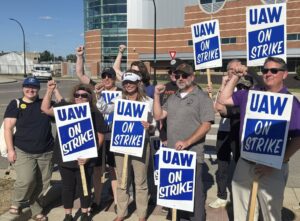Aviation Funding Stability Act Proposed to Shield FAA from Shutdowns
Aviation Funding Stability Act Introduced to Protect FAA During Shutdowns
WASHINGTON - In an effort to safeguard aviation operations amid government funding lapses, Congressmen Steve Cohen (TN-9) and Andre Carson (IN-7) have introduced the Aviation Funding Stability Act. The legislation aims to maintain the functionality of the Federal Aviation Administration (FAA) by allowing it to access the Airports and Airways Trust Fund during periods of federal budgetary uncertainty. This move comes as the temporary budget agreement is set to expire on September 30.
The proposed legislation would permit the FAA to utilize funds from the Airport and Airway Trust Fund for up to 30 days in the absence of an enacted appropriations bill. This fund, which supports the national air transportation system, is primarily financed through taxes on domestic passenger tickets, commercial fuel, general aviation gasoline, and cargo.
Congressman Cohen emphasized the importance of the bill, stating, “The Aviation Funding Stability Act is intended to prevent disruptions in aviation safety operations, air traffic control staffing, and certification processes that are vital to the U.S. economy and our national security. At a time when air travel is already strained by staffing shortages, outdated infrastructure, and record flight delays, the last thing we need is another crisis that puts safety and efficiency at risk.”
Congressman Carson highlighted the economic implications, noting, "America’s aviation system is the safest and most efficient in the world. It contributes trillions of dollars to our national economy and supports millions of American jobs. A government shutdown should not interrupt aviation or create unnecessary chaos. This bill ensures that the FAA can keep operating without disruptions, which is critical to protect public safety and the livelihoods of aviation workers who keep our country and economy moving.”
Numerous organizations have endorsed the measure, including the Air Line Pilots Association (ALPA), Airlines For America (A4A), and the National Air Traffic Controllers Association (NATCA), among others. These endorsements underscore the industry's reliance on uninterrupted FAA operations.
Echoing the need for stable aviation operations, Sara Nelson, president of the Association of Flight Attendants-CWA, stated, “We cannot allow politics to disrupt aviation safety and security. During the 2019 shutdown, our system was stretched to the breaking point, and further strained by the pandemic. A shutdown today could have catastrophic consequences for our entire economy and most importantly, for our safety and security. We urge Congress to pass the Aviation Funding Stability Act to ensure that our nation's aviation workers are able to continue our vital work without disruption.”
Kevin M. Burke, President and CEO of ACI-NA, also voiced support, recalling the impact of previous shutdowns: “The last government shutdown lasted longer than anyone expected and took a tremendous toll on our aviation system. Dedicated air traffic controllers, security officers, and other federal personnel stayed on the job without getting a paycheck. Flight delays and cancellations rippled across the system and our economy, and important airport infrastructure projects were stalled. We appreciate Reps. Cohen and Carson for putting forward this important legislation to keep the FAA and its workers open for business in the event of another government shutdown.”
Representing the Association of Professional Flight Attendants, National President Julie Hedrick remarked, “APFA endorses the Aviation Funding Stability Act to ensure that critical FAA functions are not interrupted if the government is not funded. Shutdowns are costly to any agency that is already stretched thin, and in aviation we don’t take chances. Our industry is built upon mitigating risk, so if planes are to continue flying during a government shutdown, every FAA employee and air traffic controller must remain on the job with pay to continue their safety-critical roles.”
---
Read More USA Works News


